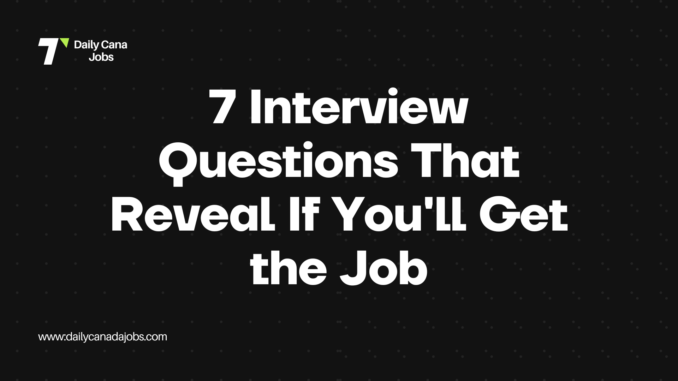
Certain interview questions carry more weight than others. These “high-stakes” questions often determine whether you make it to the next round or receive an offer. Understanding the strategic purpose behind these questions—and how to answer them effectively—can dramatically improve your interview success rate.
1. “Why are you leaving your current position?”
What they’re really asking: Are you running from problems, difficult to work with, or making a strategic career move?
Winning answer formula: Briefly acknowledge your reason for leaving, then pivot to what attracts you to this new opportunity.
Example: “While I’ve gained valuable experience leading digital marketing campaigns at my current company, I’m looking for an opportunity to specialize more deeply in content strategy, which is why your position is so appealing. I’m particularly excited about the chance to build out your thought leadership program from the ground up.”
Avoid: Complaining about your boss, colleagues, or company culture, which raises immediate red flags about your professionalism.
2. “Tell me about a time you failed.”
What they’re really asking: Do you take responsibility? Can you learn from mistakes? How resilient are you?
Winning answer formula: Briefly describe a specific situation, acknowledge your mistake, explain what you learned, and share how you’ve applied that lesson successfully.
Example: “When launching our customer portal redesign last year, I underestimated the time needed for user testing. This led to a two-week delay in our release. I took responsibility immediately, worked with stakeholders to adjust expectations, and implemented a more rigorous project planning process. Since then, I’ve delivered three major projects on schedule by building in appropriate testing windows and contingency time.”
Avoid: Choosing failures that are actually strengths in disguise (“I work too hard”) or blaming others for the outcome.
3. “How would you handle [specific challenging situation]?”
What they’re really asking: Can you apply your skills to our specific challenges? Do you understand our business context?
Winning answer formula: Demonstrate your thought process, show relevant experience, and outline a structured approach to the situation.
Example: “To address declining engagement in your email marketing program, I’d first analyze your current metrics against industry benchmarks to identify specific problem areas. Then I’d segment your audience to test personalized content strategies with each group. Based on my experience at Company X, where we increased open rates by 28% using this approach, I’d implement a continuous testing framework to optimize results over time.”
Avoid: Giving generic answers that could apply to any company or oversimplifying complex challenges.
4. “Where do you see yourself in five years?”
What they’re really asking: Will you stay long enough to be worth our investment? Do your career goals align with our growth plans?
Winning answer formula: Show ambition that aligns with the company’s trajectory while demonstrating commitment to adding long-term value.
Example: “In five years, I hope to have grown into a senior product management role where I’m leading a team and driving product strategy. I’m particularly excited about your company’s expansion into enterprise solutions, as that’s an area where I’d like to develop deeper expertise. My goal is to build a career where I can point to specific products that have made a meaningful impact on customers’ lives.”
Avoid: Mentioning goals that would take you away from the company or being so vague that it suggests lack of direction.
5. “What’s your greatest weakness?”
What they’re really asking: Are you self-aware? Do you take initiative to improve? Can you be honest about limitations?
Winning answer formula: Identify a genuine skill gap that isn’t central to the role, explain how you’re actively working to improve it, and share progress you’ve made.
Example: “I’ve sometimes struggled with public speaking, which hasn’t been central to my role as a data analyst but is becoming more important as I advance. I joined Toastmasters six months ago and have been volunteering to present findings in team meetings. My manager recently commented on how much clearer and more confident my presentations have become.”
Avoid: Disguising strengths as weaknesses or sharing weaknesses that are critical to the role.
6. “What questions do you have for me?”
What they’re really asking: Have you done your research? Are you genuinely interested in this role? Can you think critically?
Winning answer formula: Ask thoughtful questions about the role’s challenges, team dynamics, and company direction that demonstrate your strategic thinking.
Example: “I noticed your company recently launched a sustainability initiative. How does that translate to priorities for this department? Are there specific goals the person in this role would be expected to contribute to?”
Avoid: Having no questions, asking only about benefits/perks, or asking basic information readily available on their website.
7. “Why should we hire you?”
What they’re really asking: Can you articulate your unique value? Do you understand our needs?
Winning answer formula: Summarize 2-3 specific qualifications that match their needs, provide evidence of past success, and express enthusiasm for solving their particular challenges.
Example: “Based on our conversation, it seems you need someone who can both optimize your existing marketing automation and develop a strategy for new market segments. In my current role, I increased conversion rates by 45% through automation refinements, and I led our expansion into two new verticals that now account for 30% of revenue. I’m excited about applying these experiences to help you achieve the growth targets you mentioned.”
Avoid: Generic statements about being a “hard worker” or listing qualifications without connecting them to the company’s specific needs.
Leave a Reply